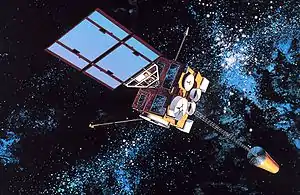GOES-U
GOES-U is a planned weather satellite, the fourth and last of the GOES-R series of satellites operated by the National Oceanic and Atmospheric Administration (NOAA). The GOES-R series will extend the availability of the Geostationary Operational Environmental Satellite (GOES) system until 2036. The satellite will be built by Lockheed Martin, based on the A2100 platform.[1]
| Names | Geostationary Operational Environmental Satellite-U |
|---|---|
| Mission type | Earth weather forecasting |
| Operator | NOAA / NASA |
| Mission duration | 15 years (planned) |
| Spacecraft properties | |
| Bus | A2100 |
| Manufacturer | Lockheed Martin |
| Launch mass | 2800 kg |
| Start of mission | |
| Launch date | 2024 (planned) |
| Launch site | Cape Canaveral |
| Orbital parameters | |
| Reference system | Geocentric orbit |
| Regime | Geostationary orbit |
Launch
The satellite is expected to be launched into space sometime in 2024 from Cape Canaveral Air Force Station, Florida, United States.[2][3] The redesign of the loop heat pipe to prevent an anomaly, as seen in GOES-17, is not expected to delay the launch as it did with GOES-T.[4]
GOES-U will also carry a copy of the Naval Research Laboratory's Compact CORonagraph (CCOR) instrument which, along with the CCOR planned for Space Weather Follow On-Lagrange 1 (SWFO-L1), will allow continued monitoring of solar wind after the retirement of the NASA-ESA European Space Agency SOHO satellite in 2025.[5][6]
It will have a mass of 2,800 kg (6,200 lb).[7]
References
- Mission overview; GOES-R Retrieved 28 November 2016
 This article incorporates text from this source, which is in the public domain.
This article incorporates text from this source, which is in the public domain. - Our Satellites NOAA, Retrieved 5 March 2017
 This article incorporates text from this source, which is in the public domain.
This article incorporates text from this source, which is in the public domain. - Oswald, Ed (22 November 2016). "Launch of GOES-R satellite a game-changing moment for weather forecasting". Digital Trends. Retrieved 29 November 2016.
- "Lockheed Martin halts work on GOES-T to wait for instrument fix". SpaceNews.com. 9 January 2019. Retrieved 26 May 2019.
- Vargas, Marco (7 January 2019). "The NOAA Space Weather Follow-On Program to Ensure Continuity of CME Imagery and Solar Wind Space-Based Observations". American Meteorilogical Society 99th Annual Meeting. AMS. Retrieved 24 March 2020.
- "Space Weather Follow On-Lagrange 1". nesdis.noaa.gov. NOAA National Environmental Satellite, Data, and Information Service (NESDIS). Retrieved 24 March 2020.
 This article incorporates text from this source, which is in the public domain.
This article incorporates text from this source, which is in the public domain. - Ray, Justin (22 August 2016). "Sophisticated new U.S. weather observatory being readied for launch". Spaceflight Now. Retrieved 19 October 2016.
